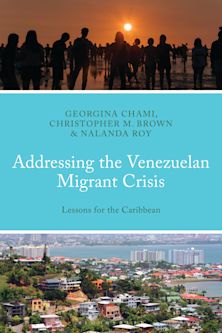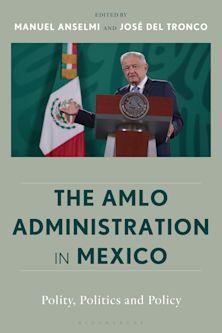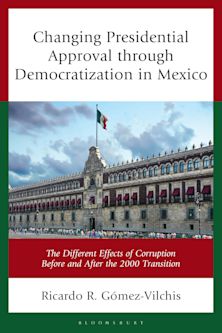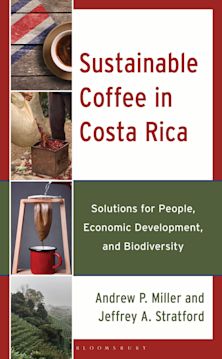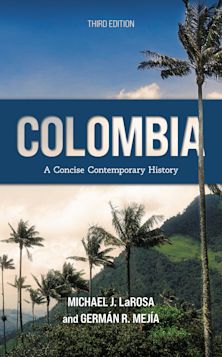- Home
- ACADEMIC
- Politics & International Relations
- Latin American Politics
- A Fervent Crusade for the National Soul
A Fervent Crusade for the National Soul
Cultural Politics in Colombia, 1930–1946
A Fervent Crusade for the National Soul
Cultural Politics in Colombia, 1930–1946
You must sign in to add this item to your wishlist. Please sign in or create an account
Description
A Fervent Crusade for the National Soul examines the implementation of cultural policies in relation to the contested configuration of citizenship in Colombia between 1930 and 1946. At a time when national identities were re-imagined all over the Americas, progressive artists and intellectuals affiliated with the liberal governments that ruled Colombia established an unprecedented bureaucratic apparatus for cultural intervention that celebrated so-called “popular culture” and rendered culture a social right. This book challenges pervasive narratives of state failure in Colombia, attending to the confrontations, negotiations, and entanglements of bureaucrats with everyday citizens that shaped the relationship between the ruler and the ruled. Catalina Muñoz argues that while culture became an instrument of inclusion, the liberal definition of popular culture as authentic and static was also a tool for domination that reinforced enduring structures of inequality founded on region, race, and gender. Liberals crafted the state as the paternalistic protector of acquiescent citizens, instead of a warden of political participation. Muñoz suggests that this form of governance allowed the elites to rule without making the structural changes required to craft a more equal society.
Table of Contents
Introduction: Cultural Politics and State Formation during the Liberal Republic
Chapter 1: “A Vastly Transcending Mission”: The Cultural Politics of Music during Colombia's Liberal Republic, 1930–1946
Chapter 2: “A Broad Path of Popular Action”: Forging Citizenship through the Stage and the Screen
Chapter 3: Hygiene, the “Social Question,” and the Making of a Racialized, Classed and Gendered Citizenship
Chapter 4: Who is Colombian? Nationalizing the Past and the Present
Epilogue
Product details
| Published | 04 Jan 2022 |
|---|---|
| Format | Ebook (PDF) |
| Edition | 1st |
| Extent | 204 |
| ISBN | 9781978783454 |
| Imprint | Lexington Books |
| Illustrations | 1 b/w photos; 1 tables; |
| Series | Social Movements in the Americas |
| Publisher | Bloomsbury Publishing |
About the contributors
Reviews
-
Incisive and creative, historian Catalina Muñoz follows Liberal politicians, bureaucrats, and intellectuals in the manner of an ethnographer using the paper trail they left behind. This critical study is beautifully crafted. Muñoz convincingly demonstrates that the simultaneous promotion of national unity and inclusion worked hand in glove with the maintenance of vertical ties for the legitimacy of the ruling elite, making the history of Colombia during the decades prior to the escalation of violence less exceptional than we have assumed. This is a must-read for anyone interested in how democracy is an ongoing, contingent project in a permanent state of expansion and contraction.
Lina Britto, Northwestern University; author of Marijuana Boom. The Rise and Fall of Colombia's First Drug Paradise
-
This timely, well-organized, and highly relevant book might best be read by starting with the epilogue and working backward. Catalina Muñoz-Rojas focuses on the cultural politics of the Colombian Liberal Republic from 1930 to 1946 and the political culture of Liberal elites and bureaucrats who sought to include the popular sectors in the national citizenry…. The writing is clear, jargon-free, and engaging. Graduate students in history and Latin American studies, specialists, and dedicated general readers will find much in this book about Colombian history as well as informed and sophisticated debates about democratic governance. Students of sociology and political science will also find useful Book Reviews / Twentieth–Twenty-First Centuries 369 comparative data for their work on state formation and democratic governance, and on state and society dynamics in Latin America.
Hispanic American Historical Review
-
CatalinaMuñoz’s book is a comprehensive and detailed history of the efforts of the Liberal governments that ruled Colombia from1930 to 1946 to shape—and control—the inclusion of a growing and increasingly contentious mass of citizens into the political process through the implementation of cultural programs. The book analyzes the discourses and policies crafted by Liberal intellectuals who occupied positions at the Ministry of Education, as well as the responses to these policies by Conservative critics and the general population... Muñoz offers a compelling argument for the comprehensive political and social change that the Liberals spearheaded in this period and the important role that education and culture played in materializing these changes.
The Americas: A Quarterly Review of Latin American History
-
In this excellent book, Catalina Muñoz-Rojas argues that Liberal politicians who ruled from 1936–1946 sought to create a more inclusive polity, breaking with Conservative governments that had maintained a rigid social hierarchy through repressive mechanisms that excluded el pueblo—workers, campesinos, indigenous and black peoples—from many of the rights that adhere to full citizenship in a democratic society.
Bulletin of Spanish Studies

ONLINE RESOURCES
Bloomsbury Collections
This book is available on Bloomsbury Collections where your library has access.












